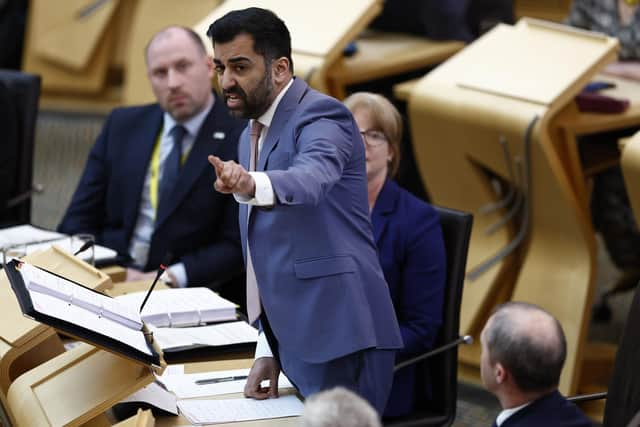SNP could be heading for a major general election setback – Joyce McMillan
It was also, by chance, a dazzlingly beautiful spring day in Edinburgh; and as I walked through the town that afternoon – from Waverley Station, across the new square where the Edinburgh office of the UK Government now sits, and down the Canongate to Holyrood Palace and the Parliament – I tried to savour the moment, and to see the glorious weather as a sign of hope, for a country that had just seen the emergence of its first national leader from an ethnic minority background.
In truth, though, grounds for optimism were hard to find, and became more so as the week progressed. Essentially, there were two questions that a good leadership election in the SNP, after 16 years in government, could and should have resolved. The first concerned the direction of policy; the question of whether Nicola Sturgeon’s centre-left First Ministership was broadly pursuing the right path for Scotland, and if so, how its performance in implementing those policies might be improved.
Advertisement
Hide AdAdvertisement
Hide AdAnd the second involved the urgent need for change at party headquarters, where Nicola Sturgeon’s husband Peter Murrell, as SNP chief executive, had for too long been running a tightly controlled political operation, based on patronage in return for loyalty, that left little room for dissent, or even for real policy debate; indeed the tensions surrounding this issue had already led to the breakaway, two years ago, of Alex Salmond’s Alba party, and also to a thriving online culture of fervent anti-SNP-leadership rhetoric, even among independence supporters.
When the candidates for the SNP leadership were announced, though, it was instantly clear that the election was unlikely to provide the necessary clarity. Humza Yousaf was the kind of “continuity” candidate that might have been expected, basically supportive of Nicola Sturgeon’s policy agenda, and only mildly committed to party reform. Kate Forbes was the leading “insurgent” candidate, but combined her commitment to change inside the party with centre-right economic views that represented a significant policy shift, and with personal opinions on subjects such as equal marriage and abortion that were disturbing and alienating to many SNP voters.
Ash Regan, the candidate most critical of recent party management, was known to have resigned her ministerial post not over those issues, but because of her opposition to the Scottish Government’s liberal gender recognition legislation. And significantly, both Kate Forbes and Ash Regan seemed at best lukewarm – and sometimes downright hostile – about the SNP’s current alliance with the independence-supporting Scottish Green party, which provides it with a slim majority in the Scottish Parliament.
Absent from the field, in other words, was any candidate clearly of the left, and supportive of Nicola Sturgeon’s policy agenda, but at the same time not close to the party establishment, and able to offer a new beginning in terms of party democracy and debate. Given the range of political views within the SNP, it seems likely that the absence of any such candidate may account, at least in part, for the 20,000 party members who simply failed to vote; faced with a choice between no change, or a shift to the anti-Green right, they simply chose neither of the above.
The result was a victory for Humza Yousaf so narrow that it resolves nothing – a negative situation greatly intensified by his failure, this week, to persuade Kate Forbes to join his Cabinet. And the tragedy for the SNP is that the conflation of the case for organisational change with relatively right-leaning and “anti-woke” views – made inevitable by the shape of the leadership contest – now suggests that the conflict in the party can only be resolved, in the short term, by a shift to the right that risks the sacrifice of all the huge electoral gains the SNP made at the expense of Labour during the Salmond-Sturgeon period.


Already, SNP members who have spent a lifetime on the left, but are now desperate for change, are penning apologias for Kate Forbes’s economic and social attitudes; and another year or so of continuing, intractable problems for Humza Yousaf’s government, with constant sniping from SNP dissidents as well as opposition parties, could bring the SNP to a UK general election setback large enough to force the First Minister’s resignation, and another leadership election.
Yet none of this ferment of dissent and discontent in the independence movement means that such a rightward shift is either necessary, or right. On the contrary, it is more like a council of despair. Despite the muttering and murmuring of those reactionary types – in the SNP and beyond – who do not like the Holyrood electoral system that gives fair representation to smaller parties, who remain in love with fossil fuels, and who despise the idea of coalition with the Greens, there is no question that governments need to take carbon reduction seriously, and include sustained Green thinking in their policy planning, or simply forget about any sustainable future for the generation of children born since 2010.
Somewhere in Scotland’s independence movement, in other words, there will be those able to see a way forward that moves on from the Sturgeon-Salmond era, in terms of party management and the wider movement’s politics, without sacrificing the clear social-democratic and environmental priorities that helped the SNP surge to dominance in Scotland. And whatever happens in the short term, we can be sure that if the independence movement is to have a successful future, it will lie with those voices, and not with those whose thinking is rooted in the tired economies orthodoxies of the 1980s, or in denial about the harsh realities of a 21st century fraught with crises that cannot be solved by reaction or nostalgia, but only by a politics that moves bravely forward, into new times.
Comments
Want to join the conversation? Please or to comment on this article.
